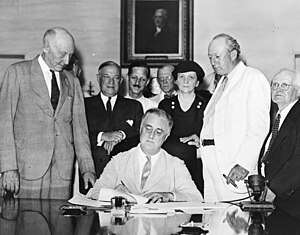By
MELLODY HOBSON /
MONEYWATCH/ September 18, 2013, 5:27 AM |
| Ida May Fuller, the first recipient (Photo credit: Wikipedia) |
 |
| Roosevelt Signs The : President Roosevelt signs Social Security Act, at approximately 3:30 pm EST on 14 August 1935. Standing with Roosevelt are Rep. (D-NC); unknown person in shadow; Sen. Robert Wagner (D-NY); Rep. John Dingell (D-MI); unknown man in bowtie; the Secretary of Labor, ; Sen. (D-MS); and Rep. David Lewis (D-MD). (Photo credit: Wikipedia) |
While those benefit amounts sound dramatically different, in theory the system is neutral -- meaning if you live to an average age, you'll end up with roughly the same total benefit no matter when you claim. ...
There is no pat answer to decide when to start collecting Social Security benefits, but there are a few guiding rules. First, if you're still working, don't claim benefits before your full retirement age. This is the rule thumb that nearly every expert can agree on. You shouldn't claim early while you're still employed unless you truly need the money to survive, because it comes with hefty penalties. Until you reach the full retirement age, for each $2 you earn in 2013 above $15,120, you lose $1 of your annual Social Security benefits. By contrast, after 66, benefits don't get cut no matter how much you earn. If you're working, try to wait. Also, don't take the money early thinking you'll make more by investing it: If you invested the money, you would need to earn more than 7 percent annually to equal what you'd make by delaying benefits until full retirement age.
 |
| Medicare & Social Security Deficits Chart (Photo credit: Wikipedia) |
And people frequently aren't confident that they've saved enough on their own to retire comfortably. It's no wonder that a recent survey of Baby Boomers found that 61 percent of respondents fear outliving their retirement more than death. Think about that for just a second. People would sooner die than outlive their retirement. This uncertainty is coloring a lot of people's decision to cash in on Social Security while they know they still can. A recent survey by BMO Retirement Institute found 83 percent of retirees were influenced to start their benefits because they were concerned about the viability of the program.
My next guiding rule: Don't take Social Security until you're sure you want it. Up until December 2011, the Social Security Administration had a "do-over" strategy that had allowed seniors to file for benefits and then later repay them, without interest, to get a bigger check. ... But since December 2011, you have only 12 months to change your mind after initially filing for benefits.
Finally, part of being a smart financial planner is answering tough questions like "How
long do you expect to live?" A calculator on the Social Security website will give you your average life expectancy. It predicts a woman turning 62 this coming year will live to an average of 85.5 and a man of the same age to 83.4. But what about your health and your genes? There are a bunch of websites that calculate your life expectancy while taking into account your health, family history, exercise, eating, drinking and driving habits and even social relationships. If you're not in great health and you want to get some of your tax dollars back, it can make sense to start claiming Social Security as early as possible.
 |
| English: This is a chart illustrating the future payouts of Social Security Benefits in the US from 2009-2083. The source of the information is the Social Security Administration's website. (Photo credit: Wikipedia) |
Deciding when to collect get a little more complicated if you're married. When a married person claims benefits, they're eligible for what they've earned or up to half of their living spouse's full retirement benefit, whichever is higher. A low earning spouse who is relying on spousal benefits takes an even bigger early claiming hit than a primary wage earner -- if he or she claims benefits at 62, they get just 35 percent of the primary earner's full retirement age check, instead of 50 percent. On the other hand, there are no extra benefits for waiting past full retirement age to claim that spousal check. That means this is the one case where no matter how you slice it, waiting past the "full retirement age" of 66 doesn't net you an extra dime.
 |
| Social Security - Ratio of workers to beneficiaries (Photo credit: Wikipedia) |
It's tricky, but if you familiarize yourself with the basic rules, you'll be okay. Another thing to remember for married people: If one partner dies, the survivor can claim the deceased spouse's check instead of his or her own, assuming the deceased spouse's check is bigger. The general rule of thumb for married couples is that at least one partner (usually the higher earning one) should delay benefits well past 66. This is "longevity insurance" for you both.
One final thing to remember: Regardless of when you take Social Security and when you stop working, you need to enroll in Medicare when you first become eligible at 65, or you could face financial penalties in the form of higher premiums.
'via Blog this'











No comments:
Post a Comment